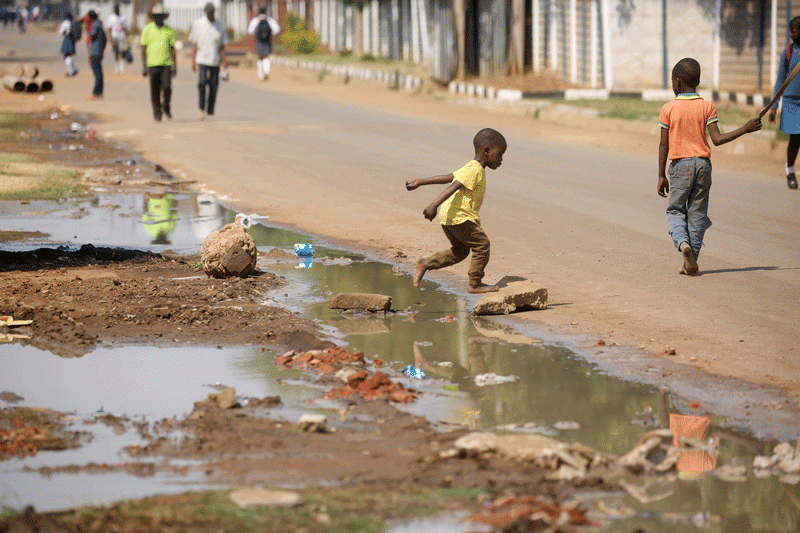
Gutu — After an opening prayer, members of the Jekesa Kuface health club in Masvingo Province’s Gutu District launched into one of their signature songs with the lyrics: “Cholera, we will not tire until we defeat you.”
Then it was time for life-saving business.
“Is everyone paid up? Because we will all suffer if we don’t keep up with our payments, cholera is no joke people, it kills,” the club’s chairman, Johnson Rwodzi, said. He went through a book with a list of names, payment details and progress on construction of toilets and other sanitation and hygiene infrastructure.
Jekesa Kuface, which translates to “brighten up the face”, is more than just a community health club is one of several health clubs recently revived with the help of the Ministry of Health and Child Care, Unicef and partners under interventions spearheaded under the United Nations United Nations Central Emergency Response Fund (CERF) in response to Zimbabwe’s cholera outbreak.
For members, Jekesa Kuface, initially formed in 2017 before faltering due to lethargy, has become more than just a health club to fight cholera.
“We do business differently. We are an empowerment forum, a way of life. We are integrating awareness with practical interventions in health and people’s general economic welfare,” said Rwodzi.
Since its revival in January, Jekesa Kuface has transformed itself into a savings club that is using sheer business acumen to ensure that apart from being a vehicle for health education, it empowers members with resources to construct hygiene infrastructure such as toilets in an area with a history of open defecation.
In addition, it is building the resilience of members to cope with food insecurity that affects the nutrition of children and ensuring people reap some money to pay for essentials such as their children’s education.
- Chitungwiza sewer infrastructure collapses
- Chitungwiza sewer infrastructure collapses
- LSU runs dry, students resort to open defecation
- Govt must prioritise water provision
Keep Reading
The concept is simple, yet effective.
Each member contributes US$1 each time the club meets. The money is pooled into a savings pot and then invested in the form of loans to members and other community members at 20 per cent interest. The profits go towards assisting each member to build a toilet at their homestead.
“That way, we ensure that even those who ordinarily would not afford to construct a toilet are able to because the money is available to buy cement and other items. Put simply, we are building toilets for each other,” said Rwodzi.
He explained: “A member digs their own hole, but we help them if they are elderly. They source mesh wire for the slab and buy two bags of cement. The club chips in with three bags of cement and also helps with the labour. Once we are done, we move to the next member.”
The target is for each member’s homestead to boast of a toilet by the end of the year.
On some days, club members conduct clean-up exercises in the village, hoping to change the attitudes of fellow community members.
At gatherings such as funerals, weddings and community meetings, they innovate with drama, song, dance and poetry performances to capture the attention of people and attract some who are still resistant to their messages, especially men. Only two members of the club are men, a composition that highlights the challenges of convincing men to participate in activities they traditionally view as reserved for girls and women.
Ten health clubs have been revived or newly established since the CERF intervention kicked in at the beginning of 2024. Realising the need to quickly act to prevent disastrous loss of lives and livelihoods during underfunded humanitarian emergencies, the U.N General Assembly established CERF as a global emergency response fund in 2006.
In Zimbabwe, CERF allowed Unicef and partners to intervene in five districts in Masvingo, Manicaland, and Matabeleland South Provinces to prevent malnutrition and disease outbreak through the provision of access to safe water, sanitation and hygiene.
Apart from provision of water infrastructure, the intervention has an emphasis on social and behaviour change underpinned by the participation of affected communities to improve awareness of safe hygiene and sanitation practices – a key factor in the prevention of waterborne diseases such as cholera.
At the core is the empowerment of village health workers (VHWs) through refresher courses and other incentives and the resuscitation or establishment of community health clubs such as Jekesa Kuface to spearhead the spread of information on critical lifesaving water, sanitation and hygiene practices.
These include construction of toilets, waste management pits, water treatment and a healthy diet for both adults and children.
In Gutu’s Rwodzi village, such ideals were seen as too lofty only a few months ago in a community where many people were either too poor or lacked information to prioritise their health and that of their children.
But the revival of the health club has changed the tide.
Rejoice Moyo is one of those whose life has changed for the better. She recalls what she describes as the “ignorant days.”
Before joining the health club, the 40-year-old mother of seven hardly regarded a toilet as a priority need. When her infant children asked to poop, she would take them to the back of a kitchen hut. For her and other older members of the family, nearby bushes provided enough cover to defecate away from prying eyes.
“It didn’t even occur to me that what I was doing was hazardous,” she said, clad in a blue t-shirt inscribed with anti-cholera messages. “Our club and the Village Health Worker opened my eyes. I now have a toilet at home, I have dug pits for waste disposal and I make sure my environment is always clean,” she said.
That’s not all. She no longer fears for her children getting malnourished because the health club has introduced a system where members help each with manual labour and knowledge to establish nutrition gardens that are providing both food and income, she said.
“From this meeting I am going to sell my vegetables. My husband is unemployed so I have become the breadwinner,” said Moyo.
Authorities say they are seeing some change.
“There is a great difference,” said Absolom Madzana, the Gutu district Principal Environmental Health Technician. “Open defecation is becoming a thing of the past because Village Health Workers and health clubs have become key drivers of the construction of toilets. We had ten toilets built within two months, which is within our target of five toilets per month,” he said, adding that six community members have been trained as builders “and have been busy at work.”
The rate of people reporting to Chimombe Rural Hospital, where Madzana is based, with diarrhoeal diseases have dropped from an average of 20 cases per month to six, while cholera cases have not been reported in recent weeks following the Unicef funded CERF intervention, said Madzana.
But that is no reason for complacency, with village health workers knocking door-to-door and addressing community meetings for awareness and surveillance.
“I have told them to always be on alert to prevent an outbreak. It takes time to stop an outbreak and it also takes a lot of resources,” he said.
“Prevention is better than cure,” added Madzana, before addressing a meeting of Jekesa Kuface Health Club.
Unicef’s cholera response is funded by multiple donors.









